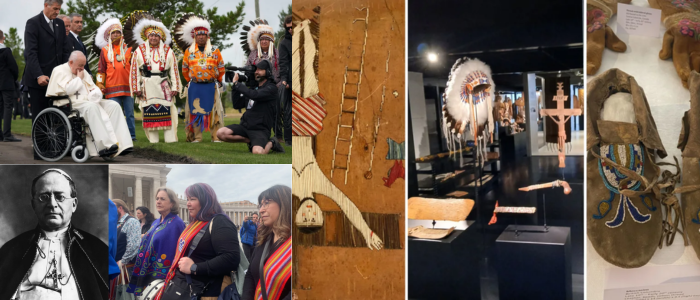Family Heirlooms of the Most Holy Type
Some of the cultural objects in the Vatican's collection are culturally and spiritually significant: a rare sealskin Inuvialuit kayak, Cree embroidered gloves, a Gwich'in baby belt, a beluga tooth necklace and a wampum belt, hundreds of years old. These were taken, not given, Indigenous leaders say, disguised as missionary work.
The artifacts were collected under Pope Pius XI in the 1920s, when the pope encouraged Catholic missionaries to gather cultural objects to demonstrate the global reach of the Church. These artifacts were among those that appeared in the 1925 Vatican Mission Exposition, which showcased Indigenous belongings even as residential schools in Canada were working to suppress Indigenous culture and languages.
Critics say the Church's line that these items were "gifts" fails to take into account the oppressive context in which they were "gifted".
Reconciliation and Spiraling Demands
In 2022, Pope Francis visited Canada to acknowledge the Church's role in the residential schools, embarking on what he called a "penitential pilgrimage." He also promised to give back objects of cultural significance. And yet, years later, most still sit the in the Anima Mundi Ethnological Museum in the Vatican.
Indigenous leaders are calling on Pope Leo, who celebrated his first mass on May 18, to pick up where he left off. "When things were taken that belonged to someone else, it's time to return them," said Cindy Woodhouse Nepinak, the National Chief of the Assembly of First Nations.
Laurie McDonald, a Cree elder and survivor of the residential school system, added that these objects are not simply artifacts; they are cultural heirlooms intended to convey traditions and stories. "Those might have been little things to you, but to us, they meant a hell of a lot."
And though Pope Francis in the past had cited the seventh commandment — "thou shall not steal" — in favor of restitution, a May 2024 investigation found that just a single artifact, a wampum belt, had been temporarily lent to Canada.
Returning the items would be a powerful act of healing, indigenous groups and a personality like Victoria Pruden of the Métis National Council wrote. "What a wonderful homecoming that would be," she said.
















